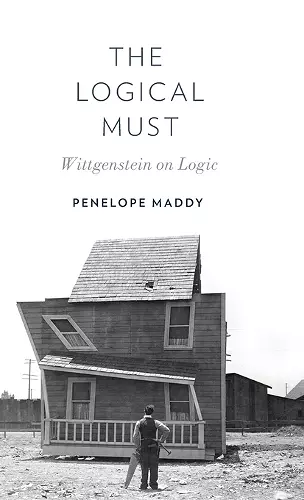The Logical Must
Wittgenstein on Logic
Format:Hardback
Publisher:Oxford University Press Inc
Published:25th Sep '14
Currently unavailable, and unfortunately no date known when it will be back
This hardback is available in another edition too:
- Paperback£30.49(9780197511787)

The Logical Must is an examination of Ludwig Wittgenstein's philosophy of logic, early and late, undertaken from an austere naturalistic perspective Penelope Maddy has called "Second Philosophy." The Second Philosopher is a humble but tireless inquirer who begins her investigation of the world with ordinary perceptual beliefs, moves from there to empirical generalizations, then to deliberate experimentation, and eventually to theory formation and confirmation. She takes this same approach to logical truth, locating its ground in simple worldly structures and our knowledge of it in our basic cognitive machinery, tuned by evolutionary pressures to detect those structures where they occur. In his early work Tractatus Logico-Philosophicus, Wittgenstein also links the logical structure of representation with the structure of the world, but he includes one key unnaturalistic assumption: that the sense of our representations must be given prior to-independently of-facts about how the world is. When that assumption is removed, the general outlines of the resulting position come surprisingly close to the Second Philosopher's roughly empirical account. In his later discussions of logic in Philosophical Investigations and Remarks on the Foundations of Mathematics, Wittgenstein also rejects this earlier assumption in favor of a picture that arises in the wake of the famous rule-following considerations. Here Wittgenstein and the Second Philosopher operate in even closer harmony-locating the ground of our logical practices in our interests, our natural inclinations and abilities, and very general features of the world-until the Second Philosopher moves to fill in the account with her empirical investigations of the world and cognition. At this point, Wittgenstein balks, but as a matter of personal animosity rather than philosophical principle.
Maddy is well placed to explore the question of the extent to which Wittgenstein's philosophy of logic, both early and late, is compatible with such a systematic naturalism ... The book covers a remarkable amount of material, yet is also extremely concise ... In its succinct ambitiousness, the book follows in the footsteps of two other exemplary short books on Wittgenstein, Wittgenstein on Rules and Private Language (Kripke 1982) and Taking Wittgenstein at his Word (Fogelin 2009). Like these otherwise very different predecessors, Maddy concentrates on a single crucial theme and is extremely selective in her use of the secondary literature. * David G. Stern, Analysis *
The book is very enjoyable to read. The style is straightforward, the argumentation crystalline, and the discussion insightful. * Sebastien Gandon, History and Philosophy of Logic *
ISBN: 9780199391752
Dimensions: 145mm x 211mm x 23mm
Weight: 272g
152 pages